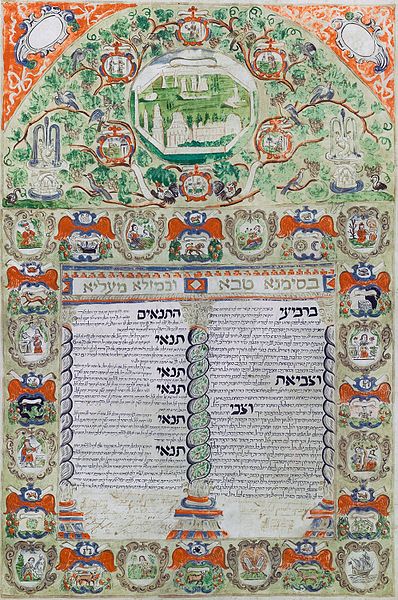 |
| A ketubah, a Jewish marriage contract. By Unattributed (Sotheby's) [Public domain], via Wikimedia Commons |
From the Tanach
Let's look a passage from the Tanach first. Then we'll move to the B'rit Chadashah.
Malachi 2:16 says, "For [HaShem], the [Elohim] of Israel, saith that He hateth putting away: for one covereth violence with his garment, saith [HaShem tz'vaot (of hosts)]: therefore take heed to your spirit, that ye deal not treacherously." (emphasis added)
It is very clear in the above passage that HaShem says He hates divorce. Yet why did He allow divorce? The answer to this question is seen in Matthew 19:1-9. In this passage, after Yeshua says married couples should not divorce, the Pharisees ask Him, "Why did Moses then command to give a writing of divorcement, and to put her away?" Yeshua answers, "because of the hardness of your hearts suffered you to put away your wives: but from the beginning it was not so".
When is divorce allowed, and when is it a sin?
Yeshua continues in Matthew 19:9 by setting out some guidelines concerning divorce and remarriage. He says, "And I say unto you, Whosoever shall put away his wife, except it be for fornication, and shall marry another, committeth adultery: and whoso marrieth her which is put away doth commit adultery."
There are two concepts concerning divorce we can deduce from this passage:
- Divorcing one to marry another is a sin. This command can be seen clearly in Mark 10:11-12: "And He saith unto them, Whosoever shall put away his wife, and marry another, committeth adultery against her. And if a woman shall put away her husband, and be married to another, she committeth adultery."
- Marrying someone who has divorced is also a sin. Committing this sin is equal to violating the seventh commandment, "Thou shalt not commit adultery".
These two are summed up in Matthew 5:31-32, which reads, " It hath been said, Whosoever shall put away his wife, let him give her a writing of divorcement: But I say unto you, That whosoever shall put away his wife, saving for the cause of fornication, causeth her to commit adultery: and whosoever shall marry her that is divorced committeth adultery."
In 1 Corinthians 7:10-16, we see more guidelines concerning divorce, especially in the case of an unbelieving spouse:
- An unbelieving spouse who insists strongly on divorce may be allowed one. However, if this is the case, is the believer allowed to remarry? On this topic the Bible does not speak explicitly.
I have listed all of the relevant passages regarding divorce in the Bible in this short article. (The other passages address situations irrelevant to today's world, such as in the case of selling a female slave, etc.) I hope this has helped, and may HaShem bless you and keep you!
Comments
Post a Comment